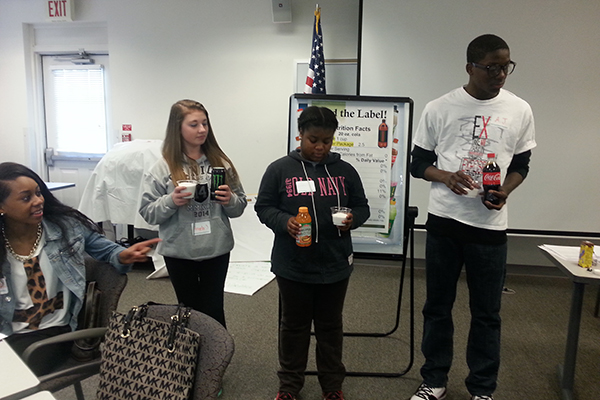
Food Smart Families
4-H offers nutrition, physical activity, shopping savvy training to Delaware youths
8:42 a.m., April 14, 2014--The University of Delaware Cooperative Extension will set out to provide 2,500 children ages 8-12 with 10 hours of nutrition, physical activity and shopping savvy education by Oct. 31 thanks to funds awarded by ConAgra Foods to the National 4-H Council.
Delaware was one of five states nationwide chosen to receive funding from the National 4-H Council to establish a Food Smart Families program.
Campus Stories
From graduates, faculty
Doctoral hooding
Using curriculum from Cornell Cooperative Extension, Sue Snider, nutrition and food safety specialist with Cooperative Extension, adapted it to create Delaware’s 10-hour curriculum, which is offered statewide and made up of five two-hour sessions.
The five sessions are:
- “Drink Low-Fat Milk and Water Instead of Sweetened Drinks!” This lesson will teach children the importance of drinking healthy beverages, especially milk and water, rather than soda and energy drinks. The children will get to make and try a strawberry smoothie.
- “Eat a Rainbow: Eat More Vegetables and Fruits!” This lesson will use food models and veggie bingo as a subtle way to encourage children to eat more fruits and vegetables. The children will make and taste calabicitas, a delicious veggie stir-fry that features a rainbow of vegetables.
- “Make Half Your Grains Whole: Eat More Whole Grains!” More whole grains equals more fiber in the diet. Children will compare various grains and get to try oatmeal pancakes as part of this lesson. Learning to read nutrition facts labels will help children find the whole grain and see how much fiber it contributes to the product.
- “Healthier Foods Fast: Eat Fewer High-Fat, High-Sugar Foods!” Making “blubber burgers” will help children visualize the amount of fat in many fast food offerings. Comparing menus for healthier options will educate the children about better choices. Broccoli bean quesadillas will be prepared to expose the children to a quick homemade alternative to fast food.
- “Power Up the Day: Eat Breakfast!” Breakfast parfaits are a quick, easy, on-the-go breakfast that will dispel the “I don’t have time” myth when it comes to breakfast. “Breakfast Olympics” will teach children to compare breakfast options in a fun and interactive way.
Kathleen Splane, extension agent and the state program leader for family and consumer sciences, explained that the curriculum will be taught at places like summer camps and schools. “In April, we’re starting in schools, we’re doing some spring break sessions and we’re conducting trainings in after school care centers, all kinds of different places -- anywhere we can reach these 8-12 year olds,” said Splane.
Mark Manno, state 4-H program leader, said he believes summer camps offer a great opportunity for the programming. “A lot of camps end early and they have after care. We are letting them know that we’ll come in for two hours at no cost and do this really cool curriculum with your kids,” said Manno.
Splane also said that another important component of the project is that teenagers will be working alongside adults to deliver the curriculum and that the students will learn leadership skills and self-confidence.
In addition to the lessons for the children, there will also be an opportunity for the parents to get involved with the program. Splane said that in addition to the 10 hours of learning, there will be an additional five hours of interactions with the children and their families, which will vary depending on the children.
“Some of them are going to be community events but the idea is to have the families receive groceries for them to be able to carry out some of the recipes that we do,” said Splane. “We’re also looking to do some supermarket shopping spree kinds of things where families compete by going up and down the aisles of a grocery store and finding the ingredients for the least amount of money to create a recipe that we give them.”
Adults and teens were trained in the curriculum on April 1 and April 3 in Dover and April 8 in Newark, with another session scheduled there April 15. Programming will begin later in April.
“We’re looking forward to it being a fun event,” said Splane. “Many of the children that are going to be reached are low-income so that’s a big component.”
Splane also pointed out that all seven professionals for the Expanded Food and Nutrition Education Program (EFPNEP) and the Supplemental Nutrition Assistance Program (SNAP) will be teaching the program statewide during the summer as well.
Kayla Martell is working as the project director for Splane, doing a lot of the work with the teens. So far, 30 teens, who are given a stipend for their work, and adult educators have been trained.
For more information contact Kathleen Splane at 302-730-4000 or email ksplane@udel.edu.
Article by Adam Thomas








